Choosing between Busuu and Memrise comes down to how you want to learn a language. Busuu offers structured lessons with grammar, speaking practice, and real feedback from native speakers. Memrise focuses on quick vocabulary learning through fun videos and repetition. This article compares both apps in a clear and simple way to help you decide which one fits your learning goals.
Memrise vs Busuu TL;DR
- Memrise is best for quick vocabulary building with short videos and spaced repetition, ideal for casual learners or travel prep.
- Busuu is best for structured learning, grammar practice, speaking exercises, and real progress from beginner to intermediate levels.
| Feature Category | Busuu | Memrise |
|---|---|---|
| Core Learning Approach | Structured courses aligned with CEFR levels; covers reading, writing, listening, speaking. | Emphasis on vocabulary and memorisation via flashcards, native-speaker videos, gamified tests. |
| Languages Offered | ~14 major languages (e.g., Spanish, French, German, Italian, Portuguese, Russian, Japanese, Chinese) in full course format. | 20+ official language courses, plus many community/user-made courses. |
| Lesson Structure & Depth | Compact lessons (5-15 minutes) with grammar, context, dialogues, voice recording & recognition. | Lessons often shorter, strong focus on vocabulary; newer features add more “immersion” content but less grammar-depth. |
| Speaking / Conversation Practice | Offers “Speaking Lessons” and recently added AI-conversation simulation to practice two-way dialogues with feedback. | Has features like chatbots (e.g., “Membot”), video clips of native speakers, and “Communicate” mode, but overall less emphasis on full conversation. |
| Feedback / Community Interaction | Strong community element: native speakers can correct written & spoken exercises. | Community-courses feature allowed learner-generated content; also personal review plans based on spaced-repetition. |
| Offline & Platform Support | Web + iOS + Android; offline download supported for Premium. | Also supports major mobile platforms; features like “Immerse” and “Communicate” require latest apps. |
| Pricing (Paid Plans) | Free tier available. Premium paid plans vary: roughly US$4-15/month depending on region & term. | Free tier available. Pro plans vary widely (e.g., ~$60/year or more) depending on region. |
| Best Suited For | Learners seeking full-scale language proficiency: grammar + conversation + structured progression. | Learners focusing on building vocabulary fast, or casual learners/travelers wanting phrase-power. |
| Less Ideal For | Learners wanting purely “fun/gaming” style might find it more formal than expected. | Learners who need deep grammar, writing, advanced conversation may find content limited. |
Memrise Overview
Memrise is a language learning app built primarily to help users memorize vocabulary quickly through repetition and multimedia content. It focuses on teaching real-life phrases instead of heavy grammar, making it ideal for learners who want fast, practical results rather than academic-style lessons.
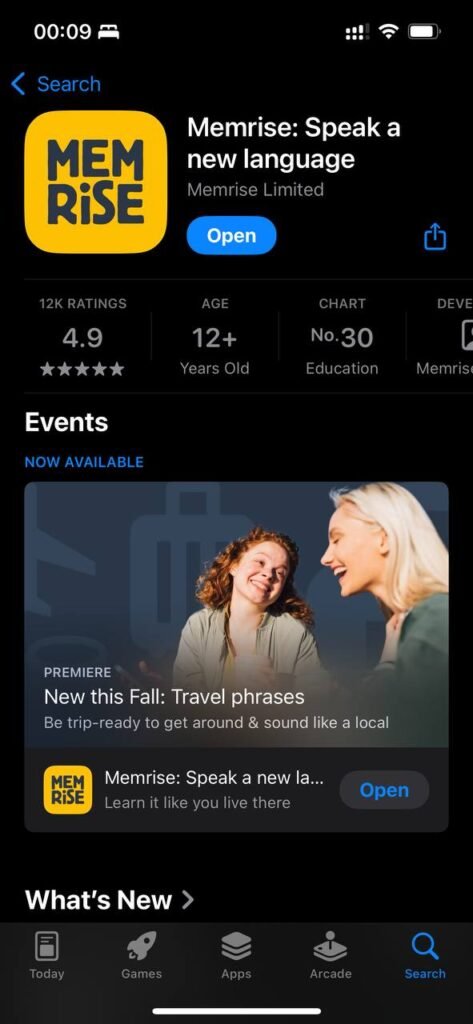
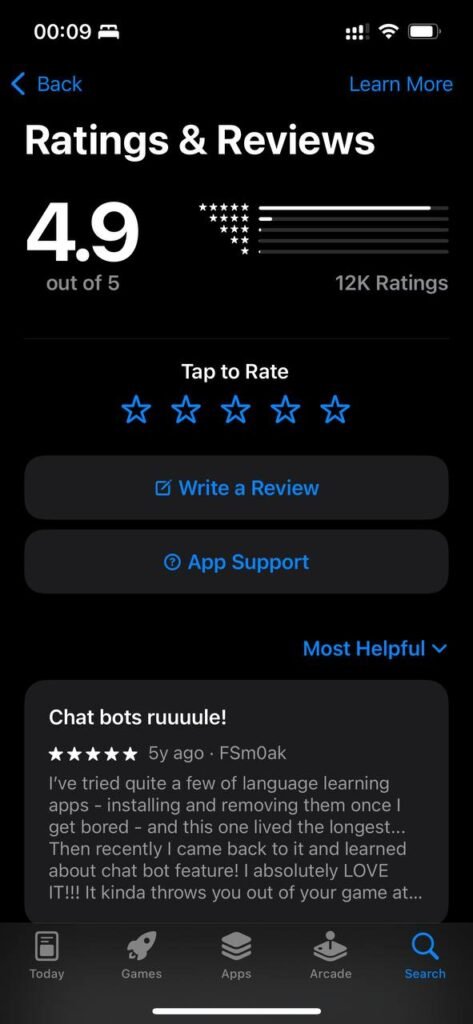
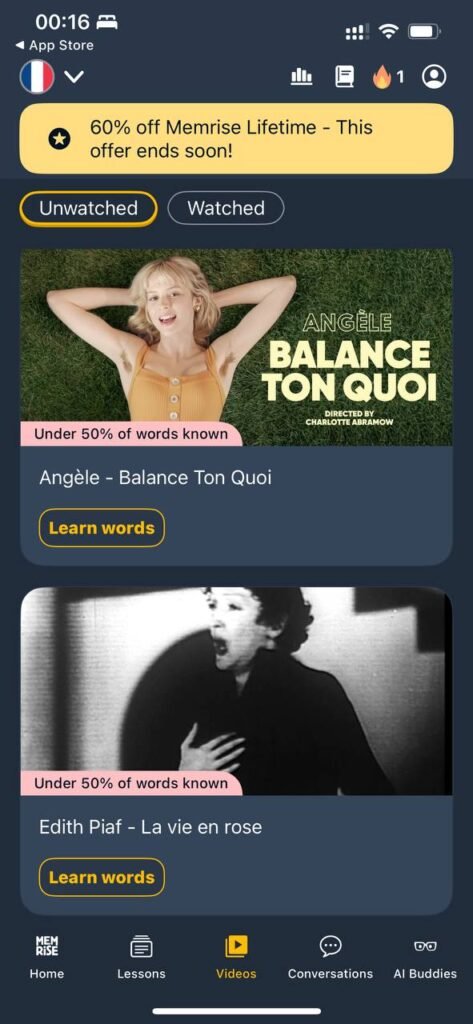
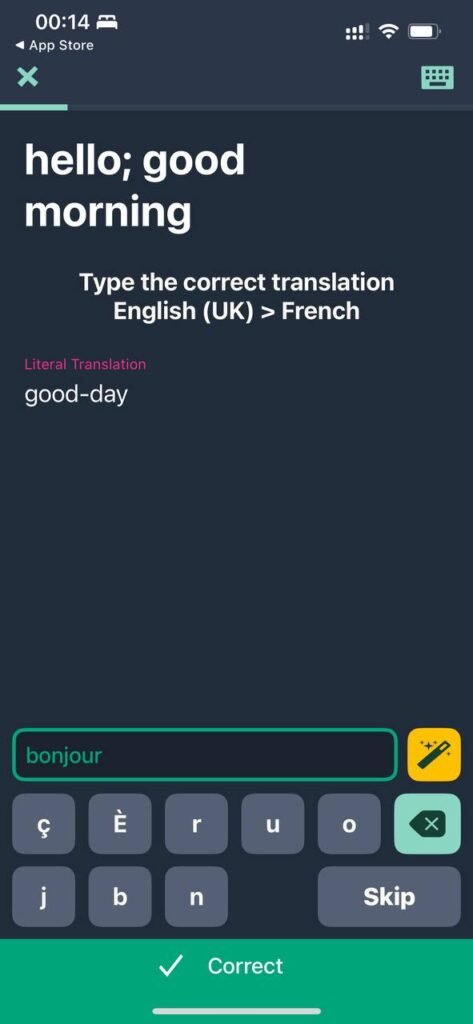

How it teaches
Memrise uses spaced repetition, a scientifically proven system that reminds you of words just before you forget them. It also includes short videos of native speakers using phrases in real contexts, helping you learn natural pronunciation and tone. Lessons are presented as quick flashcard-style exercises, with speaking, typing, and listening drills.
Learning experience
The app is designed to feel like a game. Users collect points, build streaks, and unlock levels, which makes the process more engaging. Daily goals encourage consistency, and the app adapts to your progress by repeating words you struggle with more often. It supports offline learning in the paid version.
Content variety
Memrise covers over 20 popular languages such as Spanish, French, Japanese, and Korean, as well as less common languages. It also offers themed vocabulary courses on topics like travel, business, and culture. While the platform used to rely heavily on community-created courses, it now focuses more on official courses created by language experts.
Advantages
Fast vocabulary retention, native-speaker videos, fun learning system, beginner-friendly approach, and wide language selection.
Limitations
Limited grammar explanations, less focus on sentence structure, not ideal for reaching advanced fluency, and conversation features feel basic compared to structured learning platforms.
Who it’s best for
Memrise is well suited for beginners, travelers, or learners who want to build a strong base of commonly used words and phrases. It’s especially effective for visual learners and those who prefer learning in short daily sessions.
Who should look elsewhere
Learners aiming for deep grammar understanding, structured speaking practice with feedback, or long-term fluency may need to use Memrise alongside another platform such as Busuu, Babbel, or traditional courses.
Busuu Overview
Busuu is a language learning app that provides structured, course-based lessons designed to help users build complete language skills—from vocabulary and grammar to speaking and writing. Unlike apps that focus mainly on memorization, Busuu follows a curriculum based on CEFR levels (A1 to B2), similar to formal language schools. It is designed for learners who want real progress and practical communication skills, not just word recognition.
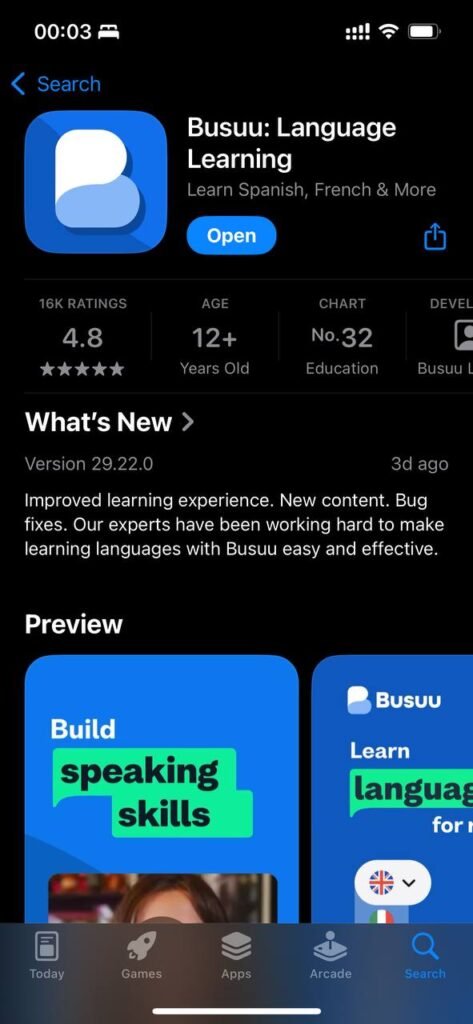
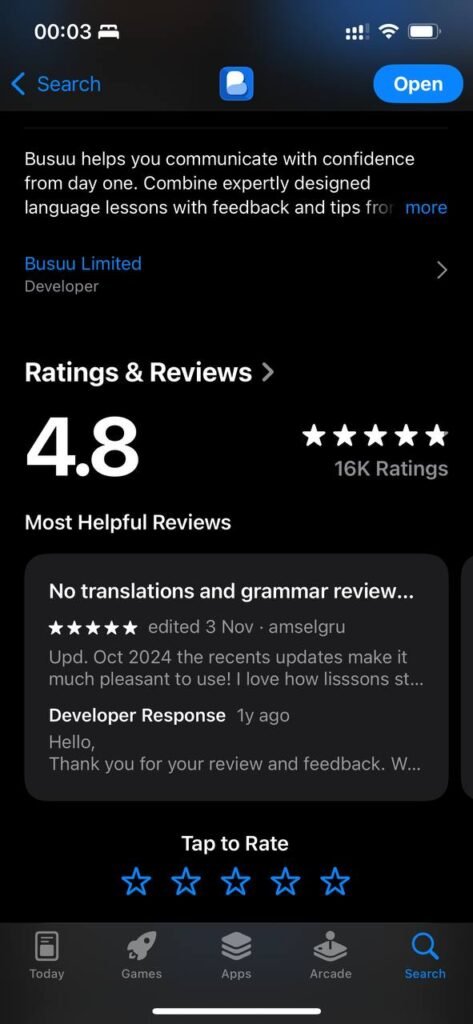

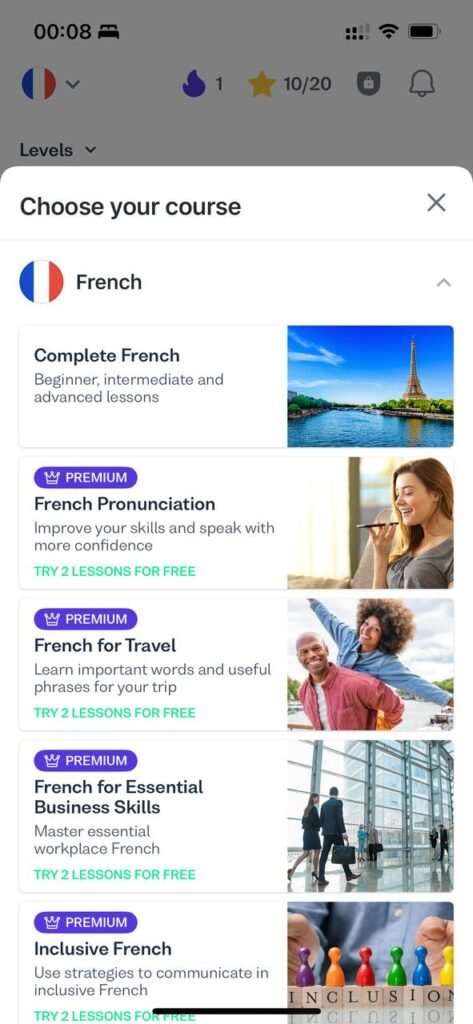
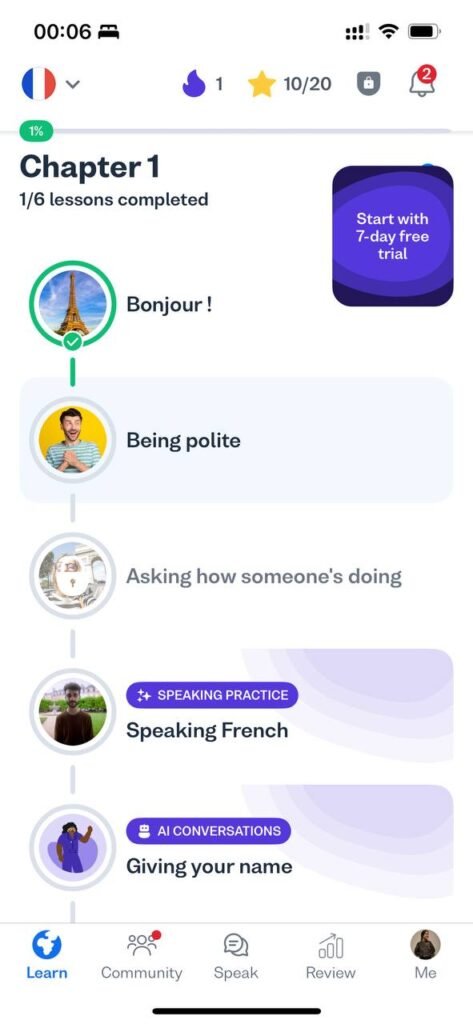
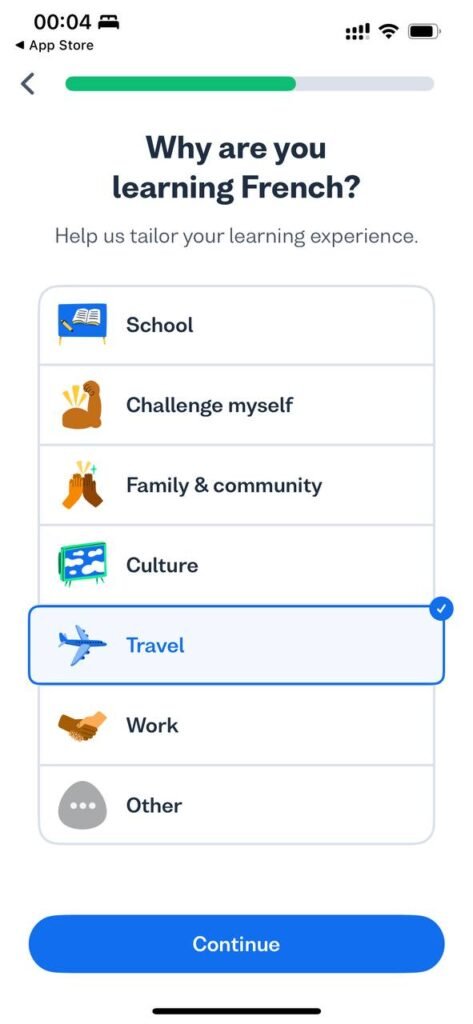
How it teaches
Busuu lessons are short and organized into levels. Each lesson includes vocabulary, grammar explanations, dialogues, pronunciation practice, and short quizzes. Many lessons simulate real conversation scenarios. The app guides you step by step and tracks your progress through clear language goals.
Speaking and feedback
One of Busuu’s strongest features is its speaking and writing exercises that are reviewed by real native speakers. You can record yourself or submit written responses and receive corrections directly from Busuu’s community. This allows you to improve pronunciation, grammar, and sentence structure in a realistic way.
Learning experience
Busuu provides a structured roadmap, making it feel more like an online language course than a game. It includes study plans, daily goals, grammar review sections, vocabulary exercises, and speaking challenges. Premium users also get personalized study plans with estimated completion dates.
Content variety
Busuu focuses on major global languages such as Spanish, French, German, Italian, English, Japanese, and others. Each language has professionally developed course content aligned with real-world usage. The platform also includes cultural tips and real-life phrases to help with everyday communication.
Advantages
Structured courses, native-speaker feedback, grammar and pronunciation training, clear progress tracking, CEFR certification, and real-world speaking practice.
Limitations
Fewer language options compared to community-driven apps, less game-like, free version is limited, and some courses (like Chinese or Japanese) may feel less detailed in advanced grammar areas.
Who it’s best for
Busuu is ideal for learners who want structured lessons, grammar guidance, and speaking practice. It is a strong choice for beginners to intermediate learners who want steady progress and real-world communication skills—not just vocabulary.
Who should consider alternatives
People who prefer casual learning, game-style apps, or quick phrase memorization might prefer something lighter. Advanced learners aiming for fluency beyond B2 may also need additional resources.
Busuu and Memrise Pricing Comparison
| Feature | Busuu | Memrise |
|---|---|---|
| Free tier | Yes — limited access to lessons, vocabulary only. | Yes — access to many courses but with limitations (ads, fewer features). |
| Paid plans | Monthly, 6-month, Annual (and in some regions 2-year) tiers | Monthly, Annual, Lifetime options. |
| Typical monthly cost (paid) | ~US$10–14 per month for monthly plan; ~$5–6 per month if annual or long-term. | ~US$14.99 per month for monthly plan; annual ~US$89.99/year; lifetime ~US$199.99. |
| What you unlock when you upgrade | Full access to lessons, grammar modules, community feedback, offline mode, certificates. | Full access to official courses, video content of native speakers, AI/Chatbot features, ad-free. |
| Learning-focus | Structured lessons covering listening, speaking, writing, grammar + community interaction. | Heavy focus on vocabulary, flashcards, native speaker videos, repetition / memory reinforcement. |
| Best for | Learners seeking a full language-learning path (grammar, conversation, feedback) | Learners wanting to boost vocabulary fast, casual or travel usage |
| Less strong in | Possibly less deep for advanced users beyond intermediate. | Less comprehensive in grammar/conversation, less structured path. |
AI Features Comparison
When it comes to artificial intelligence, Busuu offers a more advanced and practical AI learning experience, while Memrise uses AI primarily to personalize vocabulary practice. Busuu integrates AI-powered conversation tools that simulate real-life dialogues, helping users practice speaking in context with instant feedback. It can correct pronunciation, evaluate responses, and adapt the difficulty of future lessons based on performance. Additionally, Busuu uses AI to generate personalized study plans and track learning goals with CEFR-level progress.
Memrise also includes AI features, but they are more focused on vocabulary retention. It uses AI to predict which words you’re most likely to forget and automatically schedules review sessions using spaced repetition. Memrise also offers an AI chatbot called “Membot,” which allows you to practice basic dialogue, but the conversations are simpler and less customizable compared to Busuu’s simulations. Overall, Busuu’s AI helps build complete language skills, while Memrise’s AI is designed for efficient memory training and vocabulary reinforcement.
User Reviews & App Store Performance
User reviews show that Busuu enjoys strong goodwill: on the App Store it holds a 4.6-star average based on about 12.4 k ratings. On Google Play it reports 50 million+ downloads and 1.01 million reviews, with an overall rating around 4.7 stars. Users often praise its structured lessons and friendly community feedback, though some note limits beyond the intermediate level.
Memrise likewise is very popular: on Google Play it has over 10 million+ downloads and about 1.56 million reviews, with a 4.5-star rating. On the App Store it’s reported at about 4.8 stars with over 146 k ratings. While many users appreciate its fun and effective vocabulary-building tools, some complain about changes in community course access and limited depth for advanced learning.
Our Experience Using Both Apps
Using both apps side by side really highlighted how different their approaches feel in real life. Busuu feels more like having a personal tutor in your pocket—the AI conversations make you think and respond naturally, and getting real feedback from native speakers is surprisingly motivating. It actually pushed me to speak out loud and form full sentences, not just remember words. The lessons felt structured and purposeful, kind of like moving through levels of a real course.
Memrise, on the other hand, feels fun and effortless, almost like scrolling through TikTok but for languages. The native speaker video clips are great for picking up real accents and slang, and the spaced repetition system works—words actually stick. It’s the kind of app you open when you have a spare minute and want to feel productive without committing to a full lesson. However, after a while, I noticed I could remember words but wasn’t always confident using them in full sentences.

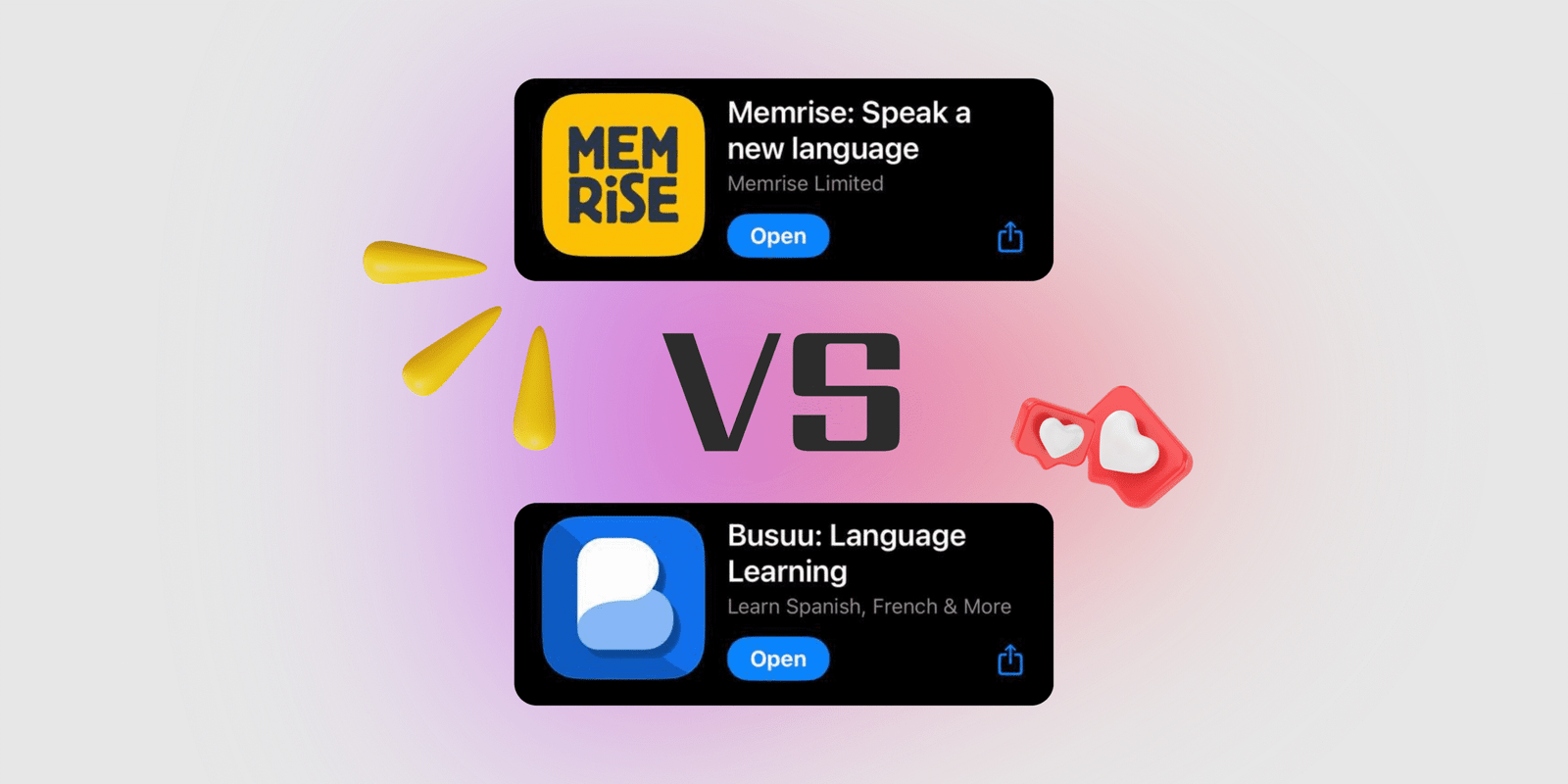
Leave a Reply